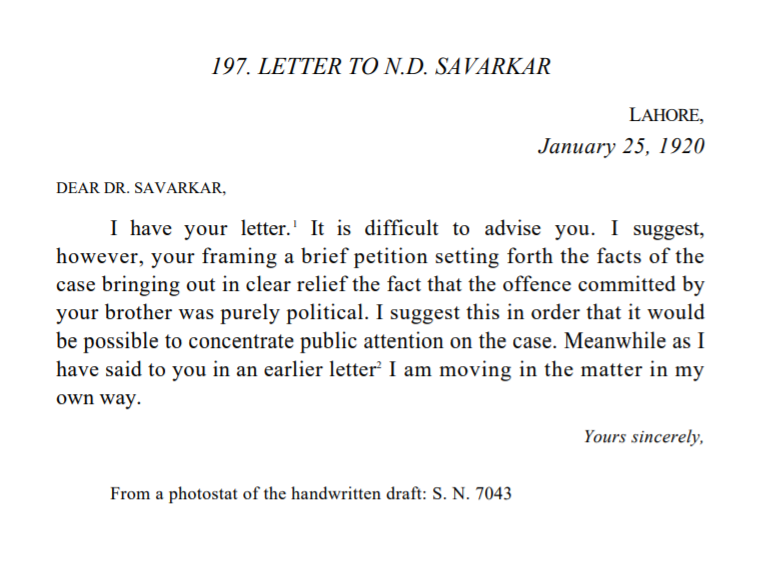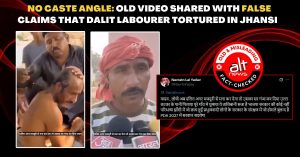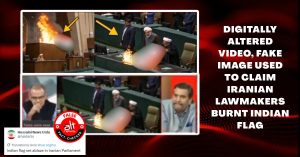Defence Minister Rajnath Singh on Wednesday claimed that Hindu Mahasabha leader Vinayak Damodar Savarkar filed mercy petitions before the British government following Mahatma Gandhi’s advice. Singh was speaking at the launch of a book on Savarkar ‘Veer Savarkar: The Man Who Could Have Prevented Partition’, authored by Uday Mahurkar and Chirayu Pandit.
“Lies were spread about Savarkar. Time and again, it was said he filed mercy petitions before the British government. But the truth is that he did not file mercy petitions for his release [from jail]. A prisoner has the right to file mercy petitions. It was Mahatma Gandhi who asked him to file mercy petitions. He filed a mercy petition after Gandhi’s advice. Mahatma Gandhi had appealed that Savarkar ji should be released. He said as we have been peacefully protesting to gain independence, Savarkar ji will also carry forward the protest,” claimed the Defence Minister, concluding that the claim – Savarkar had filed a mercy petition and begged for forgiveness – is false and baseless.
“Lies were spread about Savarkar. Time and again, it was said he filed mercy petitions before British government seeking his release from jail. It was Mahatma Gandhi who asked him to file mercy petitions”: Defence Minister Rajnath Singh at the launch of a book on Savarkar.
(ANI) pic.twitter.com/nhoKZvOHHQ
— NDTV (@ndtv) October 13, 2021
Pro-BJP website Swarajya wrote an article claiming that Singh’s assertion was true. “Congress leaders and left-wing activists, including Marxist historians, who have for decades attempted to limit Savarkar’s legacy to his mercy petition and deny him the stature of a freedom fighter—a rightful place in history, have claimed that the Defence Minister’s statement is false,” reads the article.
Swarajya cited Vikram Sampath’s book on Savarkar to support its claim. “…In 1920 Gandhiji advised Savarkar brothers to file a petition & even made a case for his release through an essay in Young India 26 May 1920,” reads Sampath’s tweet. Sampath is a biographer of VD Savarkar.
Some needless brouhaha abt statement by @rajnathsingh In my Vol 1 & in countless interviews I had stated already that in 1920 Gandhiji advised Savarkar brothers to file a petition & even made a case for his release through an essay in Young India 26 May 1920. So what’s noise abt? pic.twitter.com/FWfAHoG0MX
— Dr. Vikram Sampath, FRHistS (@vikramsampath) October 13, 2021
Did Savarkar indeed file mercy pleas following Gandhi’s advice?
After his arrest by the British government on March 13, 1910, Savarkar was brought to the Cellular Jail (Kala Pani) in Andamans on July 4, 1911.
He was arrested following the assassination of AMT Jackson, then district magistrate of Nasik. Savarkar was in London when the assassination was carried out. He was accused of providing the pistol, used to kill Jackson, from London. Savarkar and his elder brother Ganesh Damodar Savarkar had founded Mitra Mela (now called ‘Abhinav Bharat’) in Nasik, a secret revolutionary society, linked to the assassination. Ganesh Savarkar was arrested the year before in connection with another assassination of a British official.
Savarkar filed the first mercy petition in 1911.
“The official protocol demanded that all political prisoners submit clemency petitions to the government seeking their release and pardon as part of the Delhi Durbar goodwill gesture. Accordingly, everyone, including Vinayak, submitted their petitions to the jail authorities. Vinayak’s petition was received on 30 August 1911. Although no copy of this petition is extant, there remains only a reference to this in his ‘Jail History Ticket’.” This is an excerpt from the book ‘Echoes from a Forgotten Past, 1883–1924’ by Vikram Sampath.
Mahatma Gandhi was in South Africa when the clemency plea was made. He only returned to India four years later.
Savarkar filed a second mercy petition on November 14, 1913. This was also before Gandhi returned to India in 1915.
It was not until 1920 that Gandhi advised Savarkar’s younger brother Narayan Damodar Savarkar to file a petition stating that VD Savarkar’s offence was purely political. This was after Narayan Savarkar wrote to Gandhi for help.
Vikram Sampath, whose book was cited by Swarajya to incorrectly claim Rajnath Singh’s claim was true, wrote, “From his clinic in Girgaum, Bombay, Narayanrao decided to do the unthinkable. He picked up his pen and wrote a letter to a man who was ideologically opposed to his brother, but nonetheless was fast emerging as a major political voice in the country—Mohandas Karamchand Gandhi. In the first of six letters, dated 18 January 1920, he wrote to Gandhi, Narayanrao sought the latter’s help and advice in securing the release of his elder brothers in the wake of the royal proclamation.”
The letter that Narayan Savarkar wrote to Gandhi in 1920 says, “Yesterday [17 January] I was informed by the Government of India that the Savarkar brothers were not included in those that are to be released . . . It is now clear that the Indian Government have decided not to release them. Please let me hear from you as to how to proceed in such circumstances…” This letter also finds a mention on page 348 of the Collected Works of Mahatma Gandhi Volume 19.
Gandhi, in his reply on January 25, 1920, advised Narayan Savarkar to “frame a petition setting forth the facts of the case bringing out in clear relief the fact that the offence committed by your brother was purely political.” He also wrote that he is “moving in the matter” in his own way. The reply can also be found in Volume 19 of the Collected Works of Mahatma Gandhi.

Two months later, Savarkar filed a fresh petition requesting royal clemency. He thanked the British government for releasing hundreds of prisoners and stated that clemency should also extend to the remaining prisoners, including him and his brother. This petition is dated March 30, 1920.
He also spoke about the petition in a letter dated July 6, 1920 addressed to his brother. Savarkar does not mention Gandhi’s name.
On May 26, 1920, Gandhi wrote in his weekly journal ‘Young India’, “[sic]…I therefore direct My Viceroy to exercise in My name and on My behalf My Royal clemency to political offenders in the fullest measure which in his judgment is compatible with the public safety. I desire him to extend it on this condition to persons who for offenses against the State or under any special or emergency legislation, are suffering imprisonment or restrictions upon their liberty.”
He further wrote, “[sic ] Thanks to the action of the Government of India and the Provincial Governments, many of those who were undergoing imprisonment at the time have received the benefit of the Royal clemency. But there are some notable ”political offenders” who have not yet been discharged. Among these I count the Savarkar brothers…Both these brothers have declared their political opinions and both have stated that they do not entertain any revolutionary ideas and that if they were set free they would like to work under the Reforms Act4, for they consider that the Reforms enable one to work thereunder so as to achieve political responsibility for India. They both state unequivocally that they do not desire independence from the British connection. On the contrary, they feel that India’s destiny can be best worked out in association with the British…I hold therefore that unless there is absolute proof that the discharge of the two brothers who have already suffered long enough terms of imprisonment, who have lost considerably in body-weight and who have declared their political opinions, can be proved to be a danger to the State, the Viceroy is bound to give them their liberty.”
The above excerpts can be accessed in Mahatma Gandhi’s Collected Works Volume 20 (page 368).
Savarkar was released from Cellular Jail, Andamans and shifted to a prison in Ratnagiri district in May 1921.
Gandhi held a high opinion of the Savarkar brothers during their imprisonment and this is clearly reflected in his writings.
“The Savarkar Brothers’ talent should be utilized for public welfare. As it is, India is in danger of losing her two faithful sons, unless she wakes up in time. One of the brothers I know well. I had the pleasure of meeting him in London. He is brave. He is clever. He is a patriot. He was frankly a revolutionary. The evil, in its hideous form, of the present system of Government, he saw much earlier than I did, He is in the Andamans for his having loved India too well,” Gandhi wrote in ‘Young India’ May 18, 1921 edition.
But he did not agree with their violent methods. After Savarkar gained prominence as a Hindutva ideologue, Gandhi became clearer in his criticism. “To demand the vivisection of a living organism is to ask for its very life. It is a call to war. The Congress cannot be party to such a fratricidal war. Those Hindus who, like Dr Moonje and Shri Savarkar, believe in the doctrine of the sword may seek to keep the Mussalmans under Hindus domination. I do not represent that section. I represent the Congress,” Gandhi said addressing the AICC at Bombay in 1942.
Despite his disagreements with their ideology, Gandhi maintained that they should be released from prison. In 1937, when Shankarrao Deo asked Gandhi about Tatyasaheb Kelkar’s charge made during a speech in 1925 that Gandhi did not sign the memorial for Savarkar’s release from prison, Gandhi replied, “It was wholly unnecessary as Shri Savarkar was bound to be released after the coming into force of the new Act, no matter who the Ministers were. And that is what has happened. The Savarkar Brothers, at least, know that whatever the differences between us as to certain fundamentals, I could never contemplate with equanimity their incarceration.”
Savarkar was released from Ratnagiri jail in 1924 on the conditions that “he was to reside in Ratnagiri district; he could not go beyond the district’s limits without the government’s approval; he was not to engage in political activities publicly or privately; these restrictions were for five years, subject to renewal at the expiry of this period”.
There is no publicly available literature that suggests Vinayak Damodar Savarkar filed mercy petitions with the British government upon Mahatma Gandhi’s insistence. Gandhi was in South Africa when the first two pleas were filed. He later advised Savarkar’s younger brother to file a petition when he wrote to Gandhi for help. Savarkar had also written a petition after this correspondence took place but there is no evidence to suggest this was due to Gandhi’s advice or that Savarkar would not have filed the petition in 1920 if not for Gandhi. Defence Minister Rajnath Singh’s claim, therefore, stands false.
[Update: An earlier version of this report stated that Mahatma Gandhi returned to India from South Africa in 1914. He returned on January 9, 1915, and set sail from Cape Town in July 1914. The article has been updated to reflect the change.]
Independent journalism that speaks truth to power and is free of corporate and political control is possible only when people start contributing towards the same. Please consider donating towards this endeavour to fight fake news and misinformation.




